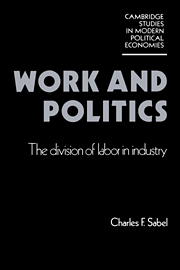5 - The end of Fordism?
Published online by Cambridge University Press: 13 October 2009
Summary
There are new things under the sun. At a time when more and more people find the traditional programs of the Left and the Right primitive, impractical, or dangerous; when society seems immobilized by conflicting interests and politics nothing but a mask covering the pursuit of selfish advantage; at a time when nothing new seems imaginable, let alone realizable, factory work is being revolutionized.
Many signs suggest that the Fordist model of organization is being challenged by new forms of the division of labor. International competition and overlapping domestic conflicts between producers and consumers, and between workers and capitalists, are driving many large firms out of mass markets for standardized goods. To survive this challenge manufacturers often have no choice but to produce more-specialized, higher-quality products. The new products must be made in new ways. Mass markets are the precondition for the Fordist organization of production; when they begin to disintegrate, Fordism begins to lose its appeal inside the factory. Where Fordism calls for the separation of conception from execution, the substitution of unskilled for skilled labor and special-purpose for universal machines, I will argue that specialization often demands the reverse: collaboration between designers and skilled producers to make a variety of goods with general-purpose machines.
What different forms this collaboration can take, whom it will benefit, and the extent to which it replaces Fordism as an explicit model of factory organization and provokes broader debate about our fundamental ideas of hierarchy are all open questions.
- Type
- Chapter
- Information
- Work and PoliticsThe Division of Labour in Industry, pp. 194 - 231Publisher: Cambridge University PressPrint publication year: 1982

